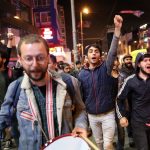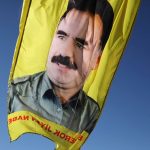Erdogan and his political rivals are not separated by an ideological disagreement, but by insatiable personal ambition
“Everything will be fine” was the election slogan of opposition candidate Ekrem Imamoglu, who narrowly won the March 31 mayoral vote in Istanbul. A Twitter account opened by dozens of Turkish artists and intellectuals in support of the man who dared defy President Recep Tayyip Erdogan’s candidate also bears the same slogan as its name.
Until Monday everything was indeed just fine. Imamoglu won and former Prime Minister Binali Yildirim lost. Then came the blow when the Supreme Elections Council annulled the Istanbul results and ordered a rerun on June 23. Erdogan’s demand for reelection, claiming vote irregularities, became an order.
The ensuing storm on Tuesday sent tsumani waves not only throughout Turkey. European leaders lambasted the decision, which mocked the democratic process. U.S. President Donald Trump, unsurprisingly, was the only one to keep silent. Democratic procedures in far-away states don’t really interest him. Erdogan for his part didn’t wait one minute before launching an ugly renewed election campaign, in which his entire prestige will be at stake.
On Tuesday, a day after the election board’s decision, the director of the presidential archive, Muhammet Safi, released a handwritten list naming dozens of artists, cinematographers and intellectuals who had denounced the move. The publication was clearly intended to portray critics as traitors and cause them harm by presenting them as opposition supporters.
Turkish intellectuals and academics already know the repercussions of signing petitions. On Wednesday, Prof. Fusun Ustel began serving a 15-month prison sentence for signing a petition in 2016, together with 1,128 academics, calling on the government to stop the deadly military operations in Kurdish provinces.
The election results in Istanbul, more than the loss in Ankara, Izmir or Adana, made Erdogan lose his self-control and not only because he began his political career in this city. Istandbul has traditionally been ruled by the Justice and Development party since it was founded in 2001. It inhabits the state’s major economic power hubs, many of which finance and support the party and Erdogan. In exchange, the development plans and big investments in the city and province are given to the president’s cronies and party supporters.
Lefteris Pitarakis,AP
This is the city that sets the country’s lifestyle and character. Anyone who wants to make the state more religious or more liberal must start the change in Istanbul. Erdogan cannot give up Istanbul at a time in which he is deepening the country’s religious orientation.
This drive to make Turkey more religious is openly demonstrated in the huge budget the parliament approved for the Religious Affairs Ministry, which in the past symbolized the separation between religion and state and Turkey’s secularity, due to its limited powers and meager budget. This year, depsite Turkey’s acute economic crisis and a decision to slash state expenses, it will receive a 36 percent increment, making the budget about $2 billion, a sum the Al-Monitor website says is even higher than the one allocated to Turkish intelligence agencies.
The Religious Affairs Ministry has grown into a conglomerate dealing with developing religious computer games for children, guiding young couples for married life, publishing books on family values, teaching Koran to refugees and even conducting joint studies to examine the moon’s appearance in Ramadan with the Technology and Science Ministry, whose budget was cut by some 56 percent.
The education system has also undergone reforms to increase the number of religious schools. Previously, graduates of these schools could only study religious subjects in universities, a course that prevented them from working in government ministries and bodies, where academic titles are required. Erdogan changed their status and opened the door for their graduates to study in all university departments and then serve in ministries. This may be an important democratic move, but it reflects the shift to a more religious state.
‘This time, Erdogan totally lost it’
The loss in the Istanbul mayoral election should not hinder Erogan’s steps to advance his ideological and religious agenda. Such strategic decisions are made at the state rather than municipal level. But mayors have enough authority to delay, obstruct or advance the plans by means of local bureaucracy. No less important is the blow to Erdogan’s prestige both personally, nationally and internationally. The reports that he was dumbstruck when he heard the results of the election in Istanbul and Ankara show how deep the blow was.
“Erdogan is usually a man with a short fuse. This time he totally lost it,” a Turkish journalist covering presidential matters told Haaretz. “He screamed at his aides and consultants, threatened to chop off heads, cursed the election campaign directors and accused everyone, from senior party officials to world leaders, of wanting to oust him from office.”
The decision to revoke the elections in Istanbul led to great anger in the party. “We must not do to others what was done to us,” said former president Abdullah Gul. A long time Erdogan ally, Gul stood by him from the beginning until Erdogan’s intention to impose a presidential regime broke up their partnership. Recently it was reported that he was planning to form a new party to represent the “real Justice and Development Party.”
Ahmet Davutoglu, who served as prime minister under Erdogan, and Ali Babacan, Erdogan’s former deputy and the government’s senior economist, don’t deny the reports of their intention to set up new parties or a united party. “In Israel, there is talk about a prime minister who serves five terms. In Turkey, Erdogan has been in power for 16 years already. Enough already. He saved Turkey from an acute economic crisis when he rose to power, but he also plunged it into an economic and political spin nobody knows how to get out of,” the journalist said.
But the disagreement in the party and the harsh verbal clashes with the opposition do not necessarily reflect an ideological difference. Halil Karaveli, a senior fellow with the Turkey Center of the Central Asia-Caucasus Institute and editor of The Turkey Analyst magazine, published this week an article in The New York Times pointing out that opposition leader Kemal Kilicdaroglu, president of the main opposition party the CHP (Republican People’s Party) isn’t exactly a model of liberalism. He supported the arrest of the leaders of pro-Kurdish party HDP and fielded Mansur Yavas, a radical nationalist, who won the Ankara mayoral elections.
AFP
Karaveli says CHP set up a coalition with the Good Party, descendant of the nationalist MHP, whose leader, Meral Aksener, was interior minister in the 1990s and ran the campaign against the Kurds.
Last month Erdogan ordered to name the Adana University after Alparslan Turkes, the founder of the nationalist party and the man who led the murderous assault against the left in the 70s. Kilicdaroglu also sponsored this decision.
Turkish politics is mistakenly labeled as a struggle between secular people and religious ones, but “in a closer look, religious and secular people in Turkey have the same shades of rightist ideology committed to unrestrained capitalism, hostility toward the working class, conservatism and nationalism,” Karaveli said.
If this analysis truly reflects Turkey’s face, then Erdogan and his political rivals are not separated by an ideological disagreement but by insatiable personal ambition. It is reflected in the frequent arguments between Erdogan and Trump, in the all-out war against any comment against him on the social networks, in his determination to portray himself as the representor of Islam and the ultimate economic expert. Turkey is him, and no foreign leader or domestic rival may dispute this equation. The loss in Istanbul is therefore much more than losing control of Turkey’s most important city. It’s an earthquake that rocks the pillars of Erdogan’s system. To paraphrase Israeli Minister Miri Regev, Erdogan says “What is the presidency worth if we cannot control Istanbul?”
There’s no telling if the rerun in Istanbul will give him victory, but the decision to hold it has trampled and crushed Turkey’s remaining democratic foundations.





